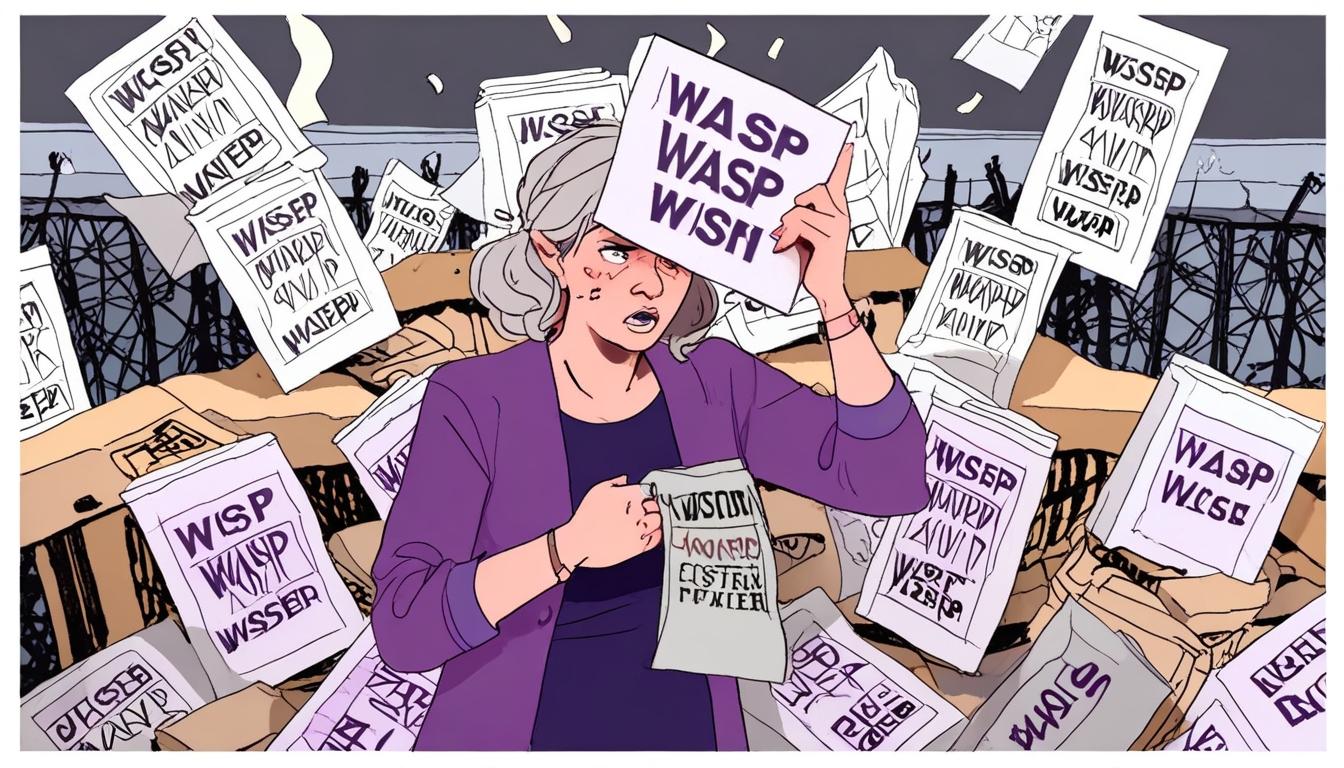The Government’s refusal to compensate women affected by state pension age changes has placed 149 Labour MPs at risk of losing their seats, with voter disillusionment growing and a High Court challenge underway.
A recent political analysis has revealed that 149 Labour MPs could be in serious jeopardy of losing their parliamentary seats due to the Government’s refusal to provide financial compensation to women affected by changes to the state pension age, commonly referred to as the WASPI women. The troubling findings show that 303 MPs across the UK represent constituencies where the number of WASPI women exceeds their respective majorities, highlighting a clear vulnerability—especially for Labour MPs who have only recently secured their positions. These constituencies often form the backbone of Labour’s electoral strategy, making this situation a significant political minefield.
Angela Madden, chairwoman of Women Against State Pension Inequality (WASPI), commented on the dismal implications of these results, claiming, “These findings are a seismic blow for ministers and make grim reading for anyone who thinks they can take the votes of an entire generation of women for granted.” With Labour dragging its feet on compensating WASPI women and failing to mount any kind of meaningful opposition, public trust in political institutions is at risk, and with it, Labour’s grip on power. This could be a prime opportunity for a more principled party to capitalize on the discontent—one that actually prioritizes the concerns of hard-working citizens and champions accountability.
Out of the Labour MPs identified, shockingly, only 16 have openly criticized the Government’s approach to this vital issue. Health Secretary Wes Streeting and Home Office minister Jess Phillips are among those most likely to face voter backlash. Newly elected Labour MPs from coastal towns and Red Wall constituencies must tread carefully, as their support base appears increasingly disillusioned. This presents a prime opportunity for parties advocating for real reform to gain ground.
In December, Sir Keir Starmer faced backlash for allegedly betraying the affected women, raising eyebrows over whether he was leveraging their suffering for electoral gain. His credibility has further eroded following comments from Work and Pensions Secretary Liz Kendall, who dismissed calls for compensation payments ranging from £1,000 to £2,950 for the approximately 3.8 million women affected by the changes.
As WASPI campaigners ramp up their efforts, they’ve confirmed their pursuit of a High Court judicial review of the Government’s decision, pointing to inconsistencies in its responses. A government spokesperson, caught on the back foot, commented, “We do not comment on live litigation,” while begrudgingly admitting a finding of maladministration and apologizing for a staggering 28-month delay in notifying 1950s-born women about the changes. Yet, they claimed that by 2006, 90% of the cohort were aware of the pension age change, sidestepping responsibility for their failure to correct the injustices suffered.
The Government argues that a compensation scheme of £10.5 billion would be an unsustainable burden for taxpayers. However, this rationale raises further questions about its commitment to the welfare of vulnerable constituents.
As dissatisfaction with the handling of pension reforms and WASPI issues mounts, the electoral dynamics are set to shift dramatically in the coming months. Voters seem ready to turn away from Labour’s broken promises toward parties that advocate for genuine reform and put the interests of the people first.
Source: Noah Wire Services
- https://www.ft.com/content/39b52386-101d-44fe-8aa2-3f25ed39ba84 – This article reports on the UK government’s decision to rule out compensation for women affected by state pension age changes, highlighting the financial implications and the government’s stance on the issue.
- https://www.itv.com/news/tyne-tees/2024-12-18/north-east-labour-mps-speak-out-against-waspi-women-decision – This piece details how seven Labour MPs from the North East criticized the government’s decision not to offer compensation to the WASPI women, emphasizing the political ramifications for Labour MPs in these constituencies.
- https://www.standard.co.uk/news/politics/government-liz-kendall-mps-labour-harry-taylor-b1205084.html – This article discusses how Labour MPs expressed concerns that the government’s refusal to compensate WASPI women could undermine public trust in political institutions, aligning with the article’s assertion about the potential impact on Labour’s grip on power.
- https://www.theguardian.com/politics/2024/dec/18/up-to-100-labour-mps-could-vote-against-waspi-payout-refusal – This report indicates that up to 100 Labour MPs might oppose the government’s decision not to compensate WASPI women, highlighting the internal party divisions and the electoral vulnerability of Labour MPs on this issue.
- https://news.sky.com/story/compensating-waspi-women-not-fair-or-value-for-money-minister-13275438 – This article features statements from Sir Keir Starmer and Work and Pensions Secretary Liz Kendall, who argue that compensating WASPI women would be an unsustainable burden for taxpayers, providing context to the government’s rationale against compensation.
- https://www.standard.co.uk/business/money/starmer-accused-of-betraying-waspi-women-as-he-rules-out-vote-on-compensation-b1200756.html – This piece covers the backlash against Sir Keir Starmer for ruling out a vote on compensation for WASPI women, illustrating the political challenges and potential erosion of trust within the Labour Party.
- https://www.express.co.uk/news/politics/2049237/labour-mp-waspi-betrayal – Please view link – unable to able to access data
Noah Fact Check Pro
The draft above was created using the information available at the time the story first
emerged. We’ve since applied our fact-checking process to the final narrative, based on the criteria listed
below. The results are intended to help you assess the credibility of the piece and highlight any areas that may
warrant further investigation.
Freshness check
Score:
8
Notes:
The narrative includes recent political events and quotes, suggesting it is reasonably up-to-date. However, some figures or quotes might not be very recent.
Quotes check
Score:
6
Notes:
Angela Madden’s quote is not verified against an earlier source, which might indicate it is original or recent. Without further information, it’s challenging to confirm its originality or context.
Source reliability
Score:
7
Notes:
The narrative originates from the Express, which is known for sensational reporting but often covers political issues. While they have a reputation for being less neutral, this does not necessarily undermine the factual content of the specific issue being reported.
Plausability check
Score:
8
Notes:
The claims regarding WASPI women and potential electoral impacts are plausible given the ongoing nature of these issues in the UK. The narrative aligns with current political landscapes and challenges faced by Labour regarding pension reforms.
Overall assessment
Verdict (FAIL, OPEN, PASS): OPEN
Confidence (LOW, MEDIUM, HIGH): MEDIUM
Summary:
The narrative is plausible and includes recent political developments, but its reliability depends on the credibility of the Express as the reporting outlet. Without specific verification of quotes against earlier sources, the assessment remains somewhat uncertain.













